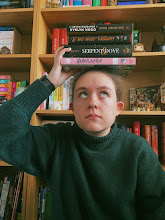Feminism in Literature
I spend half my life curled up reading. I come from a family of readers, so you could say that reading is in my blood. As much as I love reading, over the years it has dawned on me that many writers that claim to be "feminists" don't quite match the job description. Novels that are described as "feminist literature" also don't meet the challenge.A novel I had considered to be a huge push for feminist literature was Jane Eyre by Charlotte Bronte. While I adore this novel, having first encountered it at a similar age to Jane at the start of the novel, I fail to see how it can be classed as a feminist novel. Jane, a fiercely independent young woman, finds happiness in the womanizing Mr Rochester. Everyone knows the famous quote that encapsulates the feminist qualities in this novel. For those who don't, here it is, "I am no bird; and no net ensnares me: I am a free human being with an independent will". And yet, if you look at the very end of the novel, Jane has married the man who wronged her. She marries a man who tells her that he loves her and yet is already married. To me, that seems like a stupid decision, but clearly, to the Victorian audience it was meant to be read by, it was a hugely feminist idea.
It's only looking back as an older reader that I have been able to spot this. Ten-year-old me viewed it as nothing but a cute romance, set in the Yorkshire Moors. To me now, Jane Eyre is not a romance. It's an example of Victorian tradition that says, plain and clear, women can't be happy without a man. Full stop. You think this is an outdated view and yet in modern literature, many plot lines focus around romance. I can't remember the last book I read that didn't have a romance in it. Even in popular modern books, romance appears to be at the centre of it. Take Harry Potter for instance. As a professed hard-core fan, I will never stop loving these books, and yet I have spotted that they are flawed. Many of the problems the protagonists face in the last three books are caused by issues to do with romance. Even JK Rowling falls down the trap of everyone having a happy end and getting married.
I don't deny that romance shouldn't be a key part of literature. I've been known to indulge myself in a cute romance story. But romance is killing our strong, independent female characters. They don't need a man to support them when they are perfectly capable of supporting themselves.




